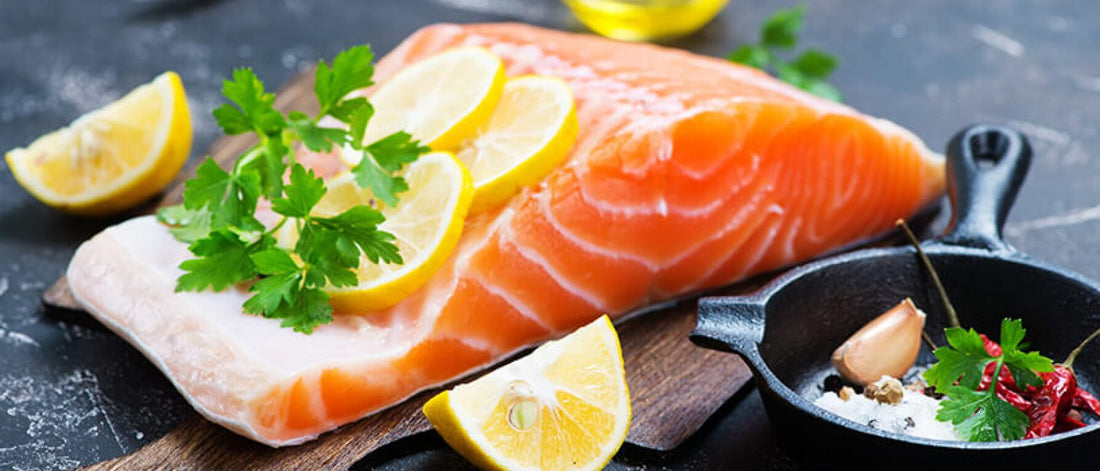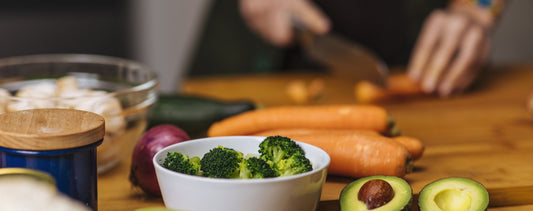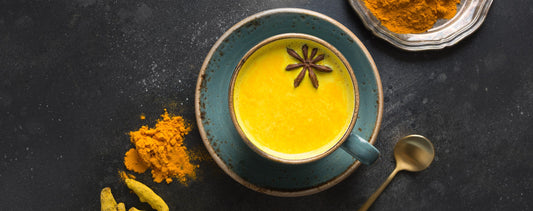Summer is the ultimate season for traveling, adventuring, and being outdoors with family and friends. In order to enjoy all of these activities it’s important for you to be in good health so that you aren’t held back from the things you love to do the most. It’s important to nourish your body with an anti-inflammatory diet to keep you healthy and pain-free.
Let’s start by talking about why you want to avoid inflammation in the first place. Have you ever heard the saying “inflammation is the root of all disease?” Many health conditions like heart disease, obesity, and cancer are associated with inflammation in the body. Sometimes you notice inflammation through symptoms like swelling, redness, pain, or heat somewhere in the body. However, inflammation can be dangerous for your health because it often goes unnoticed.
Regardless of whether you feel inflammation in your body or you don’t experience any symptoms, following an anti-inflammatory diet is highly recommended for anyone who wants to experience optimal health.
For your anti-inflammatory diet, you’ll want to eliminate or at least minimize the following foods.
Some preferable sugar replacements to try include raw stevia, dark liquid stevia, coconut palm sugar, coconut palm nectar, and monk fruit. By using these replacements you can still enjoy sweets without having the highly inflammatory effects from daily sugar consumption.
Instead of filling up on these refined carbohydrates, consider switching to nutrient-dense grains such as brown rice, wild rice, quinoa, oats, amaranth, millet, or buckwheat. Whenever possible, replace sandwiches and pizza with salads, soups, and other vegetable-based dishes.
Here are some foods to favor in your diet to help reduce inflammation.
Consider roasting these vegetables and adding them to a salad, juicing them, or blending them in smoothies.
One common way to add turmeric into your diet is to take a turmeric supplement. Make sure your supplement includes black pepper, which increases the amount of curcumin the body can absorb. You can also cook with it or enjoy a turmeric tea.
Generally speaking, incorporating more fresh food like fruits and vegetables and reducing processed and packed foods is going to be the best approach to eating an anti-inflammatory diet. To help make this shift for your health, consider eating home-cooked foods more often than eating out. Head to your local farmers market to stock up on fresh produce and share a delicious meal with family and friends.
*Editor’s Note: The information in this article is intended for your educational use only; does not necessarily reflect the opinions of the Chopra Center's Mind-Body Medical Group; and is not a substitute for professional medical advice, diagnosis, or treatment. Always seek the advice of your physician or other qualified health providers with any questions you may have regarding a medical condition and before undertaking any diet, supplement, fitness, or other health program.
Detox, de-stress, and discover the best foods and lifestyle practices to create balance for your unique mind-body type at Perfect Health, our six-day Ayurvedic cleanse retreat. Learn More.
Let’s start by talking about why you want to avoid inflammation in the first place. Have you ever heard the saying “inflammation is the root of all disease?” Many health conditions like heart disease, obesity, and cancer are associated with inflammation in the body. Sometimes you notice inflammation through symptoms like swelling, redness, pain, or heat somewhere in the body. However, inflammation can be dangerous for your health because it often goes unnoticed.
Regardless of whether you feel inflammation in your body or you don’t experience any symptoms, following an anti-inflammatory diet is highly recommended for anyone who wants to experience optimal health.
For your anti-inflammatory diet, you’ll want to eliminate or at least minimize the following foods.
Food to Avoid: Refined Sugar
Sugar and high fructose corn syrup are two highly addictive inflammatory substances. Americans are eating far more sugar than any other time in history. Most of the sugar intake comes from liquid beverages like sodas and juice; however, it is also hidden in other sneaky places like yogurt, salad dressings, and condiments such as ketchup and BBQ sauce.Some preferable sugar replacements to try include raw stevia, dark liquid stevia, coconut palm sugar, coconut palm nectar, and monk fruit. By using these replacements you can still enjoy sweets without having the highly inflammatory effects from daily sugar consumption.
Food to Avoid: Refined Carbohydrates
Refined carbohydrates are any foods that are made with refined flours, such as breads, pasta, crackers, cookies, etc. Refined carbohydrates have a similar effect on the body as sugar, and are also low in nutrient-density, which means that they provide a low amount of nutrients per calorie consumed.Instead of filling up on these refined carbohydrates, consider switching to nutrient-dense grains such as brown rice, wild rice, quinoa, oats, amaranth, millet, or buckwheat. Whenever possible, replace sandwiches and pizza with salads, soups, and other vegetable-based dishes.
Food to Avoid: Trans Fats
Trans fats have been altered to be more stable on the shelf, so are most frequently found in processed foods. Trans fats have a reputation for being bad for your health. In addition to raising bad cholesterol numbers, trans fats cause inflammation within the body. Just about anything that contains vegetable oil is likely to include trans fats—you should avoid foods like packaged doughnuts, pie crusts, and frozen pizzas. Trans fats are included on nutrition labels so check your food items before you purchase.Here are some foods to favor in your diet to help reduce inflammation.
Food to Add: Cruciferous Vegetables
Cruciferous vegetables have been shown to reduce inflammation in women (studies of men have yet to happen). This family of vegetables includes broccoli, cauliflower, Brussels sprouts, and kale. For many people, these vegetables are better digested and assimilated when they are cooked; however, they can be eaten raw, too.Consider roasting these vegetables and adding them to a salad, juicing them, or blending them in smoothies.
Food to Add: Wild Fish
Wild fish (as opposed to farmed fish) are rich in the anti-inflammatory fatty acids, omega-3 as they are eating other omega-3-filled fish rather than the pellets (that may or may not include animal protein) farmers may be feeding. Incorporate wild fish such as salmon, tuna, cod, halibut, or mahi-mahi into your diet one to three times per week. Citrus and garlic are always a great flavor pairing with wild fish.Food to Add: Turmeric
The active anti-inflammatory compound in turmeric is called curcumin. Curcumin, in combination with a high-quality fish oil, has been shown to have the same anti-inflammatory effects as taking aspirin.One common way to add turmeric into your diet is to take a turmeric supplement. Make sure your supplement includes black pepper, which increases the amount of curcumin the body can absorb. You can also cook with it or enjoy a turmeric tea.
Food to Add: Green Tea
The high amounts of polyphenols and catechins contained in green tea have shown to provide an anti-inflammatory effect on rats; studies on humans have yet to be done, but these results are promising. To get the anti-inflammatory effects, you can drink two to three cups of green tea per day, or you can take green tea extract as a supplement.Generally speaking, incorporating more fresh food like fruits and vegetables and reducing processed and packed foods is going to be the best approach to eating an anti-inflammatory diet. To help make this shift for your health, consider eating home-cooked foods more often than eating out. Head to your local farmers market to stock up on fresh produce and share a delicious meal with family and friends.
*Editor’s Note: The information in this article is intended for your educational use only; does not necessarily reflect the opinions of the Chopra Center's Mind-Body Medical Group; and is not a substitute for professional medical advice, diagnosis, or treatment. Always seek the advice of your physician or other qualified health providers with any questions you may have regarding a medical condition and before undertaking any diet, supplement, fitness, or other health program.
Detox, de-stress, and discover the best foods and lifestyle practices to create balance for your unique mind-body type at Perfect Health, our six-day Ayurvedic cleanse retreat. Learn More.






















